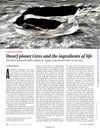 3 citations,
February 1996 in “Dermatologic Surgery”
3 citations,
February 1996 in “Dermatologic Surgery” Walter P. Unger suggests using advanced hair transplant techniques for broader coverage, as they provide natural results and use donor tissue efficiently, while also recommending personalized planning due to the unpredictable progression of baldness.
 3 citations,
August 2021 in “Cutis”
3 citations,
August 2021 in “Cutis” Some alternative medicine treatments might work for skin conditions, but their effectiveness and safety differ a lot.
 2 citations,
December 2020 in “Phytomedicine plus”
2 citations,
December 2020 in “Phytomedicine plus” Taking Saw palmetto and Pygeum africana can change the levels of certain steroids in urine, which could cause confusion in doping tests.
 2 citations,
February 2017 in “Science”
2 citations,
February 2017 in “Science” The Dawn spacecraft found that Ceres has complex organic molecules and a lot of water ice, hinting it might support life.
 2 citations,
May 2023 in “Frontiers in immunology”
2 citations,
May 2023 in “Frontiers in immunology” Skin stem cells remember past inflammation, helping them respond better to future injuries and possibly aiding in treating skin issues.
 2 citations,
September 1996 in “The American Journal of Cosmetic Surgery”
2 citations,
September 1996 in “The American Journal of Cosmetic Surgery” The authors suggest using a standard system to name hair grafts to improve communication in hair restoration.
 1 citations,
November 2023 in “Naunyn-Schmiedeberg's archives of pharmacology”
1 citations,
November 2023 in “Naunyn-Schmiedeberg's archives of pharmacology” Henna has potential health benefits and can treat various conditions, but more research is needed to confirm safety and effectiveness.
 1 citations,
June 2023 in “Ethnobotany research and applications”
1 citations,
June 2023 in “Ethnobotany research and applications” The review concludes that the Ziziphus species, especially jujube, may promote hair growth and have various health benefits, warranting more research.
 1 citations,
December 2017 in “JAMA Facial Plastic Surgery”
1 citations,
December 2017 in “JAMA Facial Plastic Surgery” Artificial hair implantation using scaffolds is possible and PHDPE is more biocompatible than ePTFE.
 1 citations,
December 2010 in “InnovAiT”
1 citations,
December 2010 in “InnovAiT” The document concludes that accurate diagnosis and appropriate management are crucial for treating various hair disorders, which have significant psychological impacts.
 1 citations,
January 2002 in “Health care on the Internet”
1 citations,
January 2002 in “Health care on the Internet” The article says Rogaine and Propecia can treat hair loss, warns about unreliable internet info, and advises talking to a doctor before using hair loss products.
 March 2024 in “Biomedical reports”
March 2024 in “Biomedical reports” Isoflavone may help manage PCOS symptoms, but its effectiveness is uncertain.
 January 2023 in “Revista da Associação Médica Brasileira”
January 2023 in “Revista da Associação Médica Brasileira” Brazilian patients with inflammatory bowel disease have a high rate of skin problems compared to healthy people.
 September 2021 in “Revista Interdisciplinar em Saúde”
September 2021 in “Revista Interdisciplinar em Saúde” Oral isotretinoína effectively stabilizes frontal fibrosing alopecia.
 October 2020 in “System Dynamics Review”
October 2020 in “System Dynamics Review” The document concludes that finasteride can reduce nandrolone detection in doping tests, suggesting frequent testing and setting metabolite level thresholds for detection.

Two nutritional supplements improved hair growth and reduced hair loss in women with hair loss conditions.
 February 2014 in “Medicine - Programa De Formación Médica Continuada Acreditado”
February 2014 in “Medicine - Programa De Formación Médica Continuada Acreditado” The document concludes that non-scarring alopecias can be reversed, but scarring alopecias cause permanent hair loss.
 July 2024 in “Frontiers in Pharmacology”
July 2024 in “Frontiers in Pharmacology” Pilose antler extracts help hair growth by activating hair follicle stem cells.
 April 2024 in “Cell death and differentiation”
April 2024 in “Cell death and differentiation” Cell death shapes skin stem cell environments, affecting inflammation, repair, and cancer.

Ziziphus jujuba and Eclipta alba leaf extracts improve blood sugar levels and cognitive function in diabetic rats.
 January 2024 in “La Ciencia al Servicio de la Salud y Nutrición”
January 2024 in “La Ciencia al Servicio de la Salud y Nutrición” Spironolactone is effective and safe for treating hair loss, excessive hair growth, and acne.
 November 2023 in “Deleted Journal”
November 2023 in “Deleted Journal” Cedrus libani has potential medicinal uses but needs more safety studies.
 September 2023 in “Frontiers in bioengineering and biotechnology”
September 2023 in “Frontiers in bioengineering and biotechnology” JAGGED1 could help regenerate tissues for bone loss and heart damage if delivered correctly.
 January 2023 in “Discovery immunology”
January 2023 in “Discovery immunology” T cells and bacteria in the gut and skin help maintain health and protect against disease.
 July 2021 in “European Journal of Plastic Surgery”
July 2021 in “European Journal of Plastic Surgery” Modern society values both traditional beauty and imperfections, but media pressures lead to more cosmetic enhancements and ethical concerns.
 March 2021 in “bioRxiv (Cold Spring Harbor Laboratory)”
March 2021 in “bioRxiv (Cold Spring Harbor Laboratory)” A specific immune response helps control mite populations on the skin, maintaining healthy hair follicles.
 October 2018 in “InTech eBooks”
October 2018 in “InTech eBooks” The most effective treatments for hair loss are minoxidil, finasteride, PRP, and hair transplants, with steroids and immunosuppressants for autoimmune types.
 March 2013 in “Revista Brasileira de Cirurgia Plástica”
March 2013 in “Revista Brasileira de Cirurgia Plástica” Using platelet growth factors can improve hair density in transplants, especially for those with fine hair.
 January 2013 in “Otorhinolaryngology clinics : an international journal”
January 2013 in “Otorhinolaryngology clinics : an international journal” PRP shows promise for improving healing and hair growth in cosmetic surgery but results can vary.
 January 2010 in “Springer eBooks”
January 2010 in “Springer eBooks” Hirsutism can lower a woman's quality of life, causing emotional distress and affecting social and work opportunities.





























